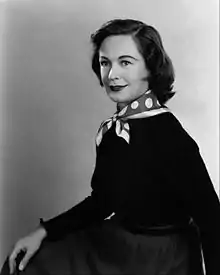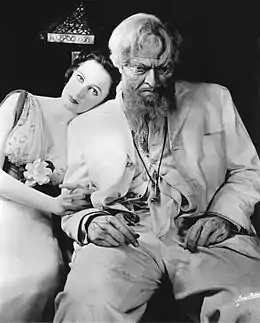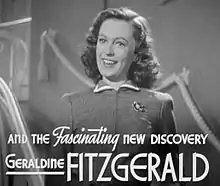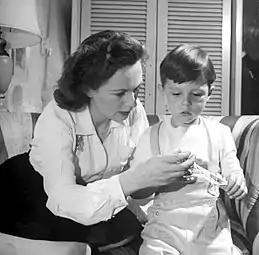Geraldine Fitzgerald
Geraldine Mary Fitzgerald (November 24, 1913 – July 17, 2005)[1] was an Irish actress and a member of the American Theater Hall of Fame.[2] In 2020, she was listed at number 30 on The Irish Times list of Ireland's greatest film actors.[3]
Geraldine Fitzgerald | |
|---|---|
 Fitzgerald in 1956 | |
| Born | Geraldine Mary Fitzgerald November 24, 1913 Greystones, County Wicklow, Ireland |
| Died | July 17, 2005 (aged 91) New York City, New York, U.S. |
| Resting place | Woodlawn Cemetery in The Bronx, New York, U.S. |
| Occupation | Actress |
| Years active | 1932–1991 |
| Spouse(s) | Edward Lindsay-Hogg
(m. 1936; div. 1946)Stuart Scheftel
(m. 1946; died 1994) |
| Children | 2, including Michael Lindsay-Hogg |
Early life
Fitzgerald was born in Greystones, County Wicklow,[4] south of Dublin, the daughter of Edith Catherine (née Richards) and Edward Martin FitzGerald, who was a lawyer.[5][6] Her father was Roman Catholic and her mother was Protestant, but converted to Catholicism.
She studied painting at the Dublin School of Art. Inspired by her aunt, actress Shelah Richards, Fitzgerald began her acting career in 1932 at Dublin's Gate Theatre. After two seasons in Dublin, she moved to London,[7]:12 where she found success in British films including The Mill on the Floss, Turn of the Tide, and Cafe Mascot.[5]
Career


Fitzgerald's success led her to New York and the Broadway stage in 1938. She made her American debut opposite Orson Welles in the Mercury Theatre production of Heartbreak House. Hollywood producer Hal B. Wallis saw her in this production and subsequently signed her to a contract with Warner Bros.[8] She had two significant successes in 1939: a role in the Bette Davis film Dark Victory,[9] and an Academy Award nomination for her supporting performance as Isabella Linton in William Wyler's Wuthering Heights.[5]
She then appeared in Shining Victory (1941), The Gay Sisters (1942), and Watch on the Rhine (1943) for Warner Bros., and Wilson (1944) for 20th Century Fox, but her career was hampered by her frequent clashes with studio management. She lost the role of Brigid O'Shaughnessy, villainess in The Maltese Falcon (1941), after clashes with executive Jack L. Warner. Although she continued to work throughout the 1940s, co-starring with John Garfield in the Warner Bros. crime drama Nobody Lives Forever (1946), the quality of her roles began to diminish and her career lost momentum.
In 1946, shortly after completing work on Three Strangers, she left Hollywood to return to New York City, where she married her second husband, Stuart Scheftel, a grandson of Isidor Straus. She returned to Britain to film So Evil My Love (1948), receiving strong reviews for her performance as an alcoholic adultress, and The Late Edwina Black (1951), before returning to the United States. She became a naturalized United States citizen on April 18, 1955.[10]
The 1950s provided her with few opportunities in film, but during the 1960s she asserted herself as a character actor and her career enjoyed a revival. Among her successful films of this period were Ten North Frederick (1958), The Pawnbroker (1964), and Rachel, Rachel (1968). Her later films included The Mango Tree (1977), for which she received an Australian Film Institute Best Actress nomination, and Harry and Tonto (1974), in a scene opposite Art Carney. In the comedy Arthur (1981), she portrayed Dudley Moore's wealthy and eccentric grandmother, even though she was only 22 years older than Moore. In 1983, she portrayed Rose Kennedy in the miniseries Kennedy with Martin Sheen, and co-starred as Joanne Woodward's mother in the 1985 drama Do You Remember Love. Fitzgerald appeared in the 1983 Rodney Dangerfield comedy Easy Money, the horror film Poltergeist II: The Other Side (1986), and the comedy Arthur 2: On the Rocks (1988).[11] In 1986, she starred alongside Tuesday Weld and River Phoenix in Circle of Violence, a television film about elder abuse.
Fitzgerald returned to stage acting, and won acclaim for her performance in the 1971 revival of Long Day's Journey Into Night. In 1976, she performed as a cabaret singer with the show Streetsongs, which played three successful runs on Broadway and was the subject of a PBS television special. She recorded an album of the show for Ben Bagley's Painted Smiles label.[12] She also achieved success as a theatre director; in 1982, she became one of the first women to receive a Tony Award nomination for Best Direction of a Play for a production of Mass Appeal.[13] While in New York, Fitzgerald collaborated with playwright and Franciscan brother Jonathan Ringkamp to found the Everyman Theater of Brooklyn, a street theater company. The company performed throughout the city, including at Ethical Culture and La MaMa Experimental Theatre Club, both in Manhattan. The company first performed at La MaMa in September 1972, with a production called Everyman at La MaMa.[14] They then performed The Francis-Day, a musical about Francis of Assisi, at La MaMa in July 1973.[15]
She appeared on television, in such series as Alfred Hitchcock Presents, Robert Montgomery Presents, Naked City, St. Elsewhere, The Golden Girls, and Cagney and Lacey. She had a regular role in the short-lived 1965 CBS serial Our Private World. In 1987, she played a title role in the television pilot Mabel and Max, produced by Barbra Streisand. She received an Emmy Award nomination for a guest role playing Anna in The Golden Girls Mother's Day episode in 1988, and played a different character in the episode "Not Another Monday".[11] She won a Daytime Emmy Award as best actress for her appearance in the NBC Special Treat episode "Rodeo Red and the Runaways".
On February 8, 1960, Fitzgerald was recognized with a star on the Hollywood Walk of Fame, at 6353 Hollywood Boulevard, for her contributions to motion pictures.[16]
Personal life

Fitzgerald married Sir Edward Lindsay-Hogg, 4th Bt. in London on November 18, 1936. She was granted a divorce in Reno on August 30, 1946, after three years of separation.[17] She had one son, director Michael Lindsay-Hogg, by her first marriage, and a daughter, Susan Scheftel, by her second marriage[5] to American businessman Stuart Straus Scheftel,[5] grandson of Ida and Isidor Straus.[18]
Her son's resemblance to Orson Welles, with whom she worked and was linked romantically in the late 1930s, led to rumors that Welles was his biological father. Fitzgerald never confirmed this to her son, but in his 2011 autobiography Lindsay-Hogg wrote that this question was resolved by his mother's close friend Gloria Vanderbilt, who had written that Fitzgerald told her that Welles was the father.[19][20]
A 2015 biography of Welles by Patrick McGilligan argues that Welles's paternity is unlikely; Fitzgerald left the United States for Ireland in late May 1939, and her son, born early May 1940, was conceived before her return in late October. Welles did not travel overseas during that period.[21]
English actress Tara Fitzgerald is Fitzgerald's great-niece.[8][22]
Death
Fitzgerald died at age 91 in New York City, following a long battle with Alzheimer's disease.[9] She is buried in Woodlawn Cemetery in The Bronx.[23]
Filmography
Television
| Year | Title | Role | Notes |
|---|---|---|---|
| 1951–1955 | Robert Montgomery Presents | Elizabeth | 4 episodes |
| 1960 | Shirley Temple's Storybook | Aunt Rosa | Episode: "The Black Sheep" |
| 1961 | Alfred Hitchcock Presents | Elizabeth Burton | Episode: "A Woman's Help" |
| 1964 | The Nurses | Nurse Carrie Bruno | 1 episode |
| 1973 | Me | Ma | aka Untold Damage |
| 1975 | NBC Special Treat | Ella McCune | Daytime Emmy Awards for Outstanding Individual Achievement in Children's Programming |
| 1977 | The Quinns | Peggy Quinn | TV Movie |
| Yesterday's Child | Emma Talbot | TV Movie | |
| 1983 | Kennedy | Rose Kennedy | TV Miniseries |
| 1985 | Do You Remember Love | Lorraine Wyatt | TV Movie |
| 1986 | Circle of Violence: A Family Drama | Charlotte Kessling | TV Movie |
| 1988–1989 | Golden Girls | Martha / Anna | 2 episodes Nominated – Primetime Emmy Awards for Outstanding Guest Performance in a Comedy Series |
| 1991 | Bump in the Night | Mrs. Beauchamps | TV Movie, (final film role) |
Radio appearances
| Year | Program | Episode/source |
|---|---|---|
| 1941 | Philip Morris Playhouse | Stage Door[24] |
References
- Geraldine Fitzgerald profile, nndb.com; accessed November 9, 2015.
- "Members". Theater Hall of Fame. Retrieved August 15, 2015.
- Clarke, Donald; Brady, Tara (June 13, 2020). "The 50 greatest Irish film actors of all time –in order". The Irish Times. Dublin. Retrieved January 3, 2021.
- "Geraldine Fitzgerald". Biography.
- Adams, Bernard (July 19, 2005). "Geraldine Fitzgerald: Independent-minded actress". The Independent. London. Retrieved August 15, 2015.
- "Geraldine Fitzgerald". The Irish Law Times and Solicitors' Journal. J. Falconer. May 29, 1966. p. 89 – via Google Books.
- "Heartbreak House". Playbill, May 2, 1938. Retrieved September 2, 2015.
- Lyman, Rick (July 19, 2005). "Geraldine Fitzgerald, 91, Star of Stage and Film, Dies". The New York Times. Retrieved August 26, 2015.
- "Geraldine Fitzgerald". The Daily Telegraph. London. Retrieved August 15, 2015.
- "Grealdine Fitzgerald Scheftel naturalization papers". Ancestry.com. Retrieved November 9, 2015.
- Geraldine Fitzgerald at IMDb
- "Streetsongs: Geraldine Fitzgerald". CastAlbums. Retrieved January 3, 2021.
- "Geraldine Fitzgerald". Tony Awards. Retrieved August 15, 2015.
- La MaMa Archives Digital Collections. "Production: Everyman at La MaMa (1972)". Accessed May 14, 2018.
- La MaMa Archives Digital Collections. "Production: Francis-Day, The (1973)". Accessed May 14, 2018.
- "Geraldine Fitzgerald". Hollywood Walk of Fame. Retrieved August 15, 2015.
- "Geraldine Fitzgerald Divorced". The New York Times. August 31, 1946. Retrieved September 2, 2015.
- Lyons, Richard D. (January 21, 1994). "Stuart Scheftel, 83; Executive Took Part In Many Civic Posts". The New York Times.
- Witchel, Alex (September 30, 2011). "Are You My Father, Orson Welles?". The New York Times.
- Lindsay-Hogg, Michael (2011). Luck and Circumstance: A Coming of Age in Hollywood, New York and Points Beyond. New York: Alfred A. Knopf. pp. 265–267. ISBN 978-0-307-59468-6.
- McGilligan, Patrick (2015). Young Orson: The Years of Luck and Genius on the Path to Citizen Kane. New York: Harper. p. 602. ISBN 978-0-06-211248-4.
- "Geraldine Fitzgerald, Irish Actress and Director Who Acted in O'Neill and Directed Mass Appeal, Dead at 91". Playbill. July 19, 2005. Retrieved August 15, 2015.
- Wilson, Scott (August 19, 2016). Resting Places: The Burial Sites of More Than 14,000 Famous Persons (3rd ed.). McFarland. ISBN 978-1-4766-2599-7 – via Google Books.
- "Johnny Presents". Harrisburg Telegraph. December 5, 1941. p. 19. Retrieved July 26, 2015 – via Newspapers.com.
External links
| Wikimedia Commons has media related to Geraldine Fitzgerald. |
- Geraldine Fitzgerald at IMDb
- Geraldine Fitzgerald at the TCM Movie Database

- Geraldine Fitzgerald at the Internet Broadway Database

- Geraldine Fitzgerald at the Internet Off-Broadway Database
- Portrait of Geraldine Fitzgerald c. 1936 by George Hurrell
- Portrait of Geraldine Fitzgerald c. 1939 by Hurrell
- Geraldine Fitzgerald at Find a Grave
- Fitzgerald's page on La MaMa Archives Digital Collections
- [Geraldine Fitzgerald papers] Billy Rose Theatre Division, The New York Public Library for the Performing Arts.